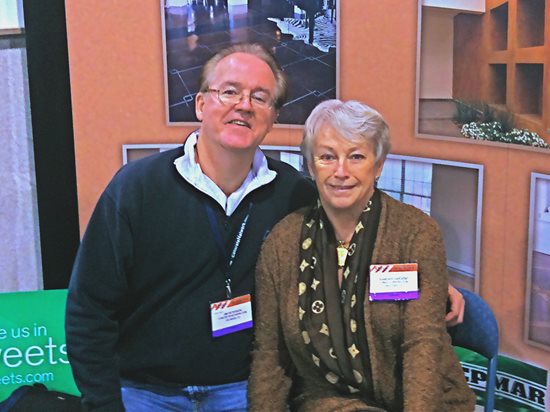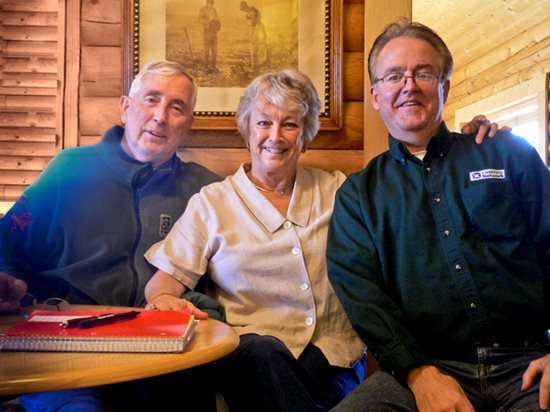- Staining Concrete
- Stamped Concrete
- Concrete Overlays
- Concrete Resurfacing
- Concrete Polishing
- Concrete Dyes
- Colored Concrete
- Indoor Concrete
- Concrete Floors
- Concrete Countertops
- Garage Floor Coatings
- Furniture, Sinks, Fire Bowls
- Basement Floors
- Outdoor Concrete
- Concrete Patios
- Concrete Driveways
- Concrete Pool Decks
- Outdoor Kitchens & Counters
- Outdoor Fireplace
- Concrete Walkways
- Concrete Pavers
- Concrete Walls
- Repair & Maintenance
- Foundation Repair
- Concrete Crack Repair
- Concrete Sealers
- Building with Concrete
- Concrete Homes
- Concrete Basements
- Decorative Concrete
- Fire Resistant
Success Tips From Barbara Sargent
2013 Decorative Concrete Hall of Fame inductee shares her secrets to building a successful businessBarbara Sargent and her husband, Sarge, have been friends of mine for many years. Barbara has always been a mentor to me (as has Sarge). It’s been 4 years now since she retired from running Kemiko, so I thought it would be a good time to ask her to share her most important success concepts as she looks back on the period of building the Kemiko brand. Nothing like a little time to clarify one’s thoughts, wouldn’t you agree?
Here are the results of that discussion. I hope the insights are as valuable to you as they have been to me.
You Are Going to Have to Work Harder Than You ImagineThe first step in her roadmap to success: When you first begin your business, you should work solo and resist hiring an assistant or staff until your new company is financially established. Self-employment is hard work and not a 9-to-5 job, particularly in the beginning. A lot of extra hours are required. She thinks self-employment is worth it, though, and took great pride in being self-employed.
Picking the Right Product or Service Is VitalBe proud of your product line and demonstrate confidence in it, so when you stand against competitors, you can hold your head high; you know that you have a good product. However, you must choose your product carefully. And if you are the product (such as a contractor or installation company), you will be involved in its development.
When Barbara and Sarge were participating in training sessions at the Decorative Concrete Institute, DCI president Bob Harris would always end the sessions by asking Barbara if there was anything she would like to add. She told attendees that if they got a specification for another product outside the Kemiko line, use that product. Don’t change the specs. Instead of being defensive about a competitor, she had enough confidence in her products that she knew they would come back to Kemiko after trying other products.
Be FlexibleIf you see signs of an economic briar patch ahead, have the guts to stop, look, and listen and the wherewithal to change. It’s never too late to implement a defensive business plan. It’s important to realize that playing defense may have to happen during your career.
Surround Yourself with WinnersChoose good company to surround yourself with. The company you keep should be a reflection of your standards. You are the steward of your brand, and you should want to work with people in the industry that you trust and who have the same work ethic and philosophy as yourself.
Be Aggressive in MarketingMarket in good times. But market even more intensely in down times, as hard as that may be to do. With over 150 trade shows under her belt and advertising in over 50 national magazines, Barbara has followed this rule to a tee. It was instrumental in putting her product out there on the national stage. Everyone knows you have to spend money to make money, but if you do that in a down time and choose your pipeline to the public well, you will be out of the chute quickly and have a head start when things come back.
Be HumbleBeing humble and appreciative are two qualities of a successful business person. These qualities help you open doors and make a mark in your industry and community.
Keep Learning and SharingSome say you can’t teach an old dog new tricks and that young pups are reluctant to value the old-fashioned path. Barbara could not disagree more strongly. Older people should link with and learn from younger people and then adjust to generational shifts. And younger people should realize that it’s okay to go back in time, particularly as it relates to good values. A mix of young and old attributes is useful.
Change is inevitable. But you have to be willing to keep abreast of change. Know your product line as well as your competitors’ products. Constantly research, never ease up on learning, and be willing to change or tweak your business plan as you grow and diversify.
Holding insights close to the vest is passé. Sharing ideas and information with others shows that you care about them and the betterment of the industry. Leaders are always learning, teaching, and answering questions.
Barbara got much of her business experience while working for 21 years at Lambert Landscape Company in Dallas, Texas, where she was in charge of their retail store. She did purchasing, marketing, and customer service and was mentored by customer Stanley Marcus of Neiman Marcus fame. He taught her invaluable lessons (she called them “Mr. Stanley’s rules”), and he told her not to vary from these lessons, to stay with them. Here they are:
Don’t Borrow Money in the First Three Years of BusinessMany new businesses will usually fold within 3 years, as the odds of success are tipped against you. If you are still in business after 3 years, then you will probably be a success. After 3 years, banks will come knocking to loan you money. At that point, borrowing is okay because you may need to buy more equipment, hire more people, increase your marketing, or travel more for business.
Zero in on a Specific ClientBarbara started marketing concrete stains to homeowners, rather than focusing on the commercial staining market, which had entrenched competitors. She went right to the ladies who were picking out flooring. Then she moved over to the men who would do the installation. She never went the commercial route because she was not confident she could get into that market, so she went in through the back door.
Not Everybody Likes What You LikeDon’t think that what you like and what you personally buy will be what everyone likes. While running the retail operation at Lambert’s, Barbara wouldn’t order products in yellow and orange because she didn’t like those colors. When Marcus learned about this, he told her that yellow and orange are popular colors in Europe and encouraged her to buy them. They sold very well. Look at all the options in the market when making your offering, not just what you like.
People Want to Talk to PeopleDon’t go to an automated phone system as the first contact with the customer. Your first contact is a lasting impression, and you want to capture that customer right away. When Barbara ran Kemiko, she never went to an automated system. From 9 to 5, they picked up the call in person. What’s amazing is how many people comment that they can’t believe they are talking to a real person.
Work 24/7 to Get the Business GoingWhen Barbara and Sarge first made the commitment to follow one of Mr. Stanley’s rules, to work 7 days a week, 24/7, they had a toll-free telephone number put in their home. If the phone rang in the middle of the night, she didn’t know if the call was from Britain, Italy, or Australia. She would pop out of bed and cheerfully say, “Kemiko,” out of a dead sleep. That’s how they got started. She didn’t want to miss a single call because she wanted to make sure she got the caller’s address to send them all the information. She gave them her website so they could learn how to stain concrete, and she told them where to buy the product. She let them know if they had any technical questions, they could call her day or night.
They were working so much that one day Sarge asked what day it was, and Barbara said she didn’t know. At that point, finally, they knew they needed to bring on some help. Barbara and Sarge are now enjoying their semi-retirement, however, they continue to assist customers and promote the Kemiko product nationwide through their north Texas outlets.
Kemiko Concrete Products, Inc.
Leonard, TX
http://www.kemikostainforconcrete.com/
Learn more from Barbara Sargent:
Barbara Sargent Industry Leader Profile
Hindsight with Barbara Sargent of Kemiko







